Embrace Building Wraps marks climate milestone with 20,500 trees planted
Scaffolding project manager convicted after temporary bridge collapse
Funeral details confirmed as NASC publishes tribute to Wayne Connolly
A leader who lived his values
The NASC obituary describes Mr Connolly as funny, honest, plain-speaking and always open to opportunity, qualities that shaped both his business career and his leadership within the industry. He spoke frequently about the importance of creating opportunities for others, a principle that underpinned his work across multiple organisations. One of his final public appearances took place at Manchester Central on the eve of ScaffEx25. While teams of scaffolders prepared exhibition stands, Mr Connolly arrived in full dinner suit to record an opening address for the Scaffolding Excellence Awards. He later joined a Bond-themed promotional film, an episode the NASC said captured his humour, self-awareness and willingness to support others.From entrepreneur to industry statesman
A natural entrepreneur, Mr Connolly first built a successful car maintenance business before founding Connolly Scaffolding, which has grown into a well-established and progressive contractor. The company recently expanded into new headquarters. Within the NASC, Mr Connolly served as Regional Chair and Chair of the Membership Standards Committee before joining the board in 2022. In 2024, he was appointed President and Chair of both NASC and the Construction Industry Scaffolders Record Scheme.
Funeral arrangements
Wayne Connolly is remembered by his fiancée, Nicola, three children and three stepchildren. His funeral will take place at 1.30 pm on Wednesday, 21 January 2026, at St Peter’s Church, The Village, Prestbury, Macclesfield SK10 4DG. All are welcome to attend, with a private service for family members to follow. For those unable to attend in person, the service will be accessible via live stream, with details to be shared by the NASC ahead of the funeral.The real value of competition in scaffolding
Competition in system scaffolding
I and many others believe that an investment in system scaffolding is in the best interests of most scaffolding contractors. Any scaffolding contractor who adopts system will improve their business performance and commercial value – with the right approach. And that starts with exploring several system options on all points of service, and not just price. Just doing a basic review of price can be very misleading and can mean you end up making the wrong choice for your business. Of course, system scaffolding is a competitive market. But it is also quite a simple one. Those system scaffolding brands that have NASC approval and are TG30 compliant have been independently verified for product quality, customer support, overall offering and price point. So those companies should be your starting point. From that perspective, every business in the industry knows exactly who’s in their market, and what the competitive position is. Add in those new businesses who are seeking approval – because they know they have a high-quality offering – and you have an active market that makes it easier for clients to evaluate their options. So, as a contractor thinking about investing in system scaffolding, you have a good spread of offers, and a clear basis for comparison. I need to mention mixing as part of this discussion. Where you are just using tube and fitting, mixing is not an issue. But if you’re using tube and fitting and a staircase, for example, that is a form of mixing. My conversations with the NASC have made it clear that the introduction of TG30 takes system scaffolding onto a level playing field with tube and fitting in terms of design compliance. This alignment removes what the NASC sees as a long-standing barrier to adoption by providing a recognised, cost-effective route to design compliance for system scaffolding that mirrors the robustness and assurance of the tried and tested TG20 tube and fitting solution. But it does open the question of mixing. Any NASC-approved system scaffolding in its original form is, in my personal opinion, the best option to choose for any scaffolding contractor. But I do appreciate that some companies wish to – and do – mix equipment and as long as that equipment has manufacturers mixing approval certification or an engineer’s technical assessment and is in line with the engineering criteria set by TG30, then it’s compliant. And so, that adds to the competitive landscape.Top tips for healthy competition
It’s easy to say that competition is a valuable thing in the market – but how do you manage it on a day-to-day basis? Here are my top tips. Know your real competitors. Any good business plan involves a competitor analysis. Who are your main competitors and how do their product, pricing and service offerings differ from yours? How do they target customers? Do they invest in good quality marketing to support their sales teams? What does their after-sales service look like? Understanding your competition allows you to see your own strengths and weaknesses and plan accordingly. We all have something to learn from each other. Respect the competition. We work in a relatively small industry, where people know each other well. You may come across your competitors at industry showcases like ScaffEx, or by taking part in NASC committees and events. No good ever comes of bad-mouthing your competition. In fact, by building respectful relationships and an open dialogue (whilst keeping your own strategies confidential, of course), you become part of a better, more productive industry in general. Be clear about your goals. Competition is healthy because it gives you an incentive to continually review your strategy and goals. But I’m still amazed by the number of businesses I talk to who don’t have even a short-term business plan. A clear strategy and defined, measurable goals will help you to benchmark and measure your progress against your major competitors. Don’t be afraid to change. But don’t change unnecessarily. You want to be leading the crowd, not following it. If you can see that you need to improve in a certain area, get on with it. But focus on your own growth and your own goals so that you have a clear way forward. Be realistic. Remember that bigger isn’t always better. When a potential customer analyses what product they should invest in, they have to look at your complete offering across the board to see how it might be beneficial for their own business. In some respects, elements of what is offered have little potential benefit given the size of the customer’s business, or the activity levels. So you won’t win every customer, and that’s just business.Does endorsement help your competitive edge?
I’ve been asked over the past two or three years to endorse or promote various products. All but three, I’ve turned away. It’s humbling to know that my opinion and support matters to businesses. And because of that, I don’t endorse everything. I’m very clear about the products and businesses I work with – they must be high quality products that genuinely make a difference to scaffolding contractors. The business itself must be forward-thinking and have good plans in place to have an impact in the market. And the people must be professional, hard working and able to take advice and critical input. That’s why you won’t see me endorsing anything and everything – so far, I’ve worked with Layher on its Allround system scaffolding, with Kewazo on its LIFTBOT and with Baton software on its dedicated ERP system. I’ve also started working with ULMA, a Spanish-based brand that works internationally. I’m helping ULMA to shape its business plan and offering for entry into the UK market with the BRIO system, which is currently going through the NASC approval process. And this work is about bringing more options, competitions and offerings to the scaffolding contractor market. I’m no longer the MD of one company – I’m an advocate for the wider benefits of system, and the long-term commercial success of the industry. I’ve worked with and alongside other system manufacturers and they all have my respect. We all believe in the same outcome for contractors – and that’s the important thing. To summarise, being truly competitive means having a clear vision that’s based on a deep understanding of your market, and is translated into strategies and actions that you can measure. So embrace competition – use it to make your own business better and stronger, and you will automatically help to give your clients the outcomes they want and need – and support the industry to flourish.Engineering excellence in the Alps: Pilosio’s Olympic challenge
The Challenge
The Zuel ski jump has been a fixture of the Cortina d’Ampezzo basin since hosting events during the 1956 Winter Olympics. Its distinctive silhouette, familiar to generations of visitors and immortalised in James Bond films, had gradually deteriorated over the decades. Restoring the structure presented several significant obstacles. The ski jump’s irregular geometry, with its steeply inclined inrun ramp and vertical tower, meant standard scaffolding configurations would not work. The site’s altitude and exposed position subjected any temporary structures to strong winds. Meanwhile, the building’s status as a local landmark demanded an approach that would harmonise with the surrounding landscape. Bergamo-based contractor Ecoedile commissioned Euroedile Scaffolding to design and erect the scaffolding. The brief was clear: fully encapsulate the ski jump to enable comprehensive restoration whilst maintaining structural integrity and worker safety throughout.
The Solution
Euroedile’s project manager, surveyor Daniele Crosato, knew the project required detailed planning before a single tube reached site. His team began with full 3D modelling of the temporary structures, creating a digital twin that could be shared with site management and used to identify potential issues before installation. “This model enabled us to identify a crucial aspect: the temporary structures were designed to transfer all loads directly to the ground,” Crosato explains. The approach eliminated the need to anchor into the historic structure itself, protecting the building fabric whilst ensuring stability. The solution ultimately required 160 tonnes of steel and aluminium temporary structures, comprising 22 kilometres of linear steel tube and 2,700 square metres of working platforms—equivalent to ten tennis courts of safe working area at height. Euroedile selected Pilosio’s MP multidirectional scaffolding system as the backbone of the installation. The system’s versatility proved essential in adapting to the ski jump’s complex geometry, allowing standards and ledgers to follow the varying inclinations and curves along both the inrun ramp and tower. “The MP system’s four-way connectivity gave us the flexibility to configure the scaffold around a highly non-standard structure,” says Crosato. “We needed that adaptability to maintain structural stability whilst supporting working loads, equipment and personnel in an exposed environment.”Access and Logistics
Getting workers and materials to working height on a structure of this scale presented its own challenges. Euroedile installed four suspended walkways extending from the central tower to stepped platforms beneath the ramp, providing quick access to key working areas.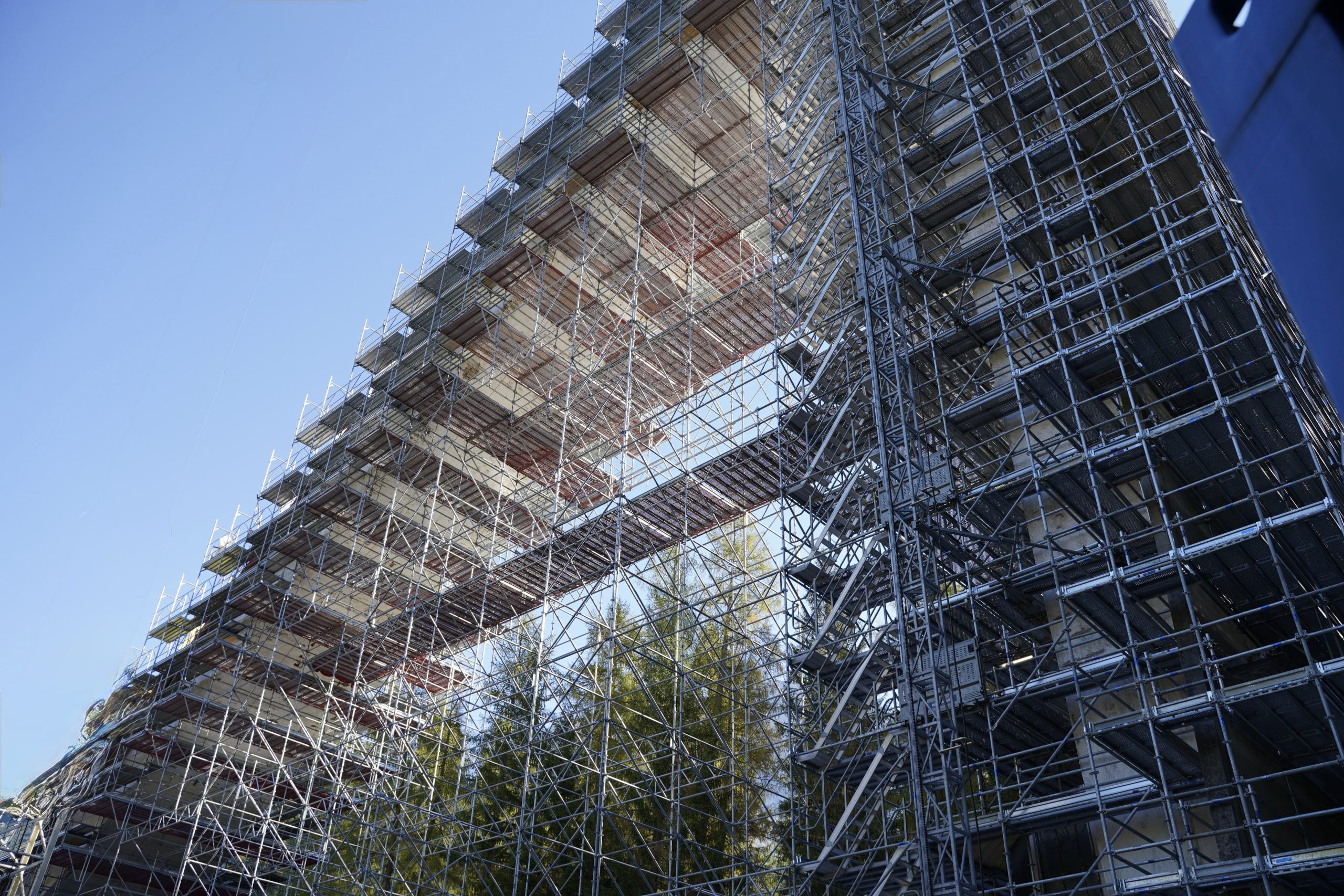 For vertical transport, the team employed Pilosio’s Up transport platform, using it to lift both materials and personnel to the upper levels. Whilst the platform provided the fastest route to height, safety considerations meant installing a full-height access stairway as an emergency escape route for the workforce.
The logistics of moving 160 tonnes of scaffold components onto an alpine site, then assembling them around an irregular structure at height, required careful sequencing. The 3D model proved invaluable here, allowing the team to plan the build sequence and identify potential bottlenecks before they became site problems.
For vertical transport, the team employed Pilosio’s Up transport platform, using it to lift both materials and personnel to the upper levels. Whilst the platform provided the fastest route to height, safety considerations meant installing a full-height access stairway as an emergency escape route for the workforce.
The logistics of moving 160 tonnes of scaffold components onto an alpine site, then assembling them around an irregular structure at height, required careful sequencing. The 3D model proved invaluable here, allowing the team to plan the build sequence and identify potential bottlenecks before they became site problems.
The Pilosio Perspective
For Pilosio, based in Tavagnacco, the project represents the kind of high-profile application where their engineered systems can demonstrate their capabilities. Company president Nereo Parisotto sees the installation as more than just scaffolding. “A symbol that, for years, everyone entering the Ampezzo basin has seen on the left, gradually fading under the effects of time and decay,” he notes. “Looking at it today, mid-transformation, we see not only its glorious past but also the engineering developed by our technical team, who set out to design structures in harmony and perfect balance with the surrounding environment.” The shiny steel grid of standards and ledgers has created what Parisotto describes as a structural geometry that magnifies rather than obscures the landmark. The installation has become something of a local attraction itself, with residents stopping to photograph the wrapped structure.Technical Specs
The scale of the installation reflects the complexity of the challenge:- Tower height: 51 meters
- Inrun ramp length: 83 meters
- Total structure weight: 160 tons (steel and aluminium)
- Linear tube: 22 kilometers
- Working platform area: 2,700 square meters
- Access walkways: Four suspended units
- Vertical transport: Pilosio Up platform with multiple landings
- Emergency access: Full-height stairway
Lessons and Outcomes
The project demonstrates several principles that apply beyond this specific installation. Full 3D modelling allowed the team to identify and solve problems digitally before they became expensive site issues. The MP multidirectional system’s versatility proved essential when working with non-standard geometry. Meanwhile, careful attention to access and logistics ensured the scaffold served as an effective working platform rather than simply meeting minimum safety requirements. Ecoedile’s restoration work is progressing with the support of Euroedile’s temporary structures. The scaffold is scheduled for dismantling during the first months of 2026, when the restored ski jump will be returned to the community ahead of the Winter Olympics. The story does not end there. Pilosio’s structures will be redeployed for restoration of the ski jump’s side stands, also part of the overall contract awarded to Ecoedile. The ability to adapt and reuse the temporary structures across different phases demonstrates the economic value of well-engineered scaffold systems on complex projects. For Pilosio and Euroedile, the Cortina ski jump represents a showcase project—the kind of high-profile, technically demanding installation that tests systems and capabilities. As the scaffold currently enveloping the structure catches the alpine light, it stands as a testament to modern scaffold engineering meeting historic architecture. This article was originally published in Issue 28 of the ScaffMag magazine.Layher Allround supports complex heritage restoration at Royal Victoria Country Park
Engineered solutions, supported on-site
The Abbey’s size and layout required a bespoke scaffold arrangement incorporating long-span bridging, multiple access levels, and high load capacity. Layher Allround’s modular design allowed the structure to be adapted around architectural features while maintaining consistent system performance. Specialist design solutions were required to manage the scaffold’s height and weight. Crane-assisted lifts were used to position materials at extreme elevations, with Layher Allround components providing the strength and reliability needed during critical phases.
Layher UK’s technical and site teams, including Clive Rowe, worked closely with Skill Scaffolding throughout installation, providing ongoing support as the scaffold took shape.
Sean Pike, Managing Director of Layher UK, said: “We were pleased to support Skill Scaffolding and the project team on this prestigious heritage scheme. The project demonstrates how Layher Allround can be integrated into complex environments, while close collaboration and on-site support ensure the right solution is delivered safely and efficiently.”
One of the most demanding stages coincided with exceptionally high winds, adding further pressure to lifting operations and sequencing. Despite these conditions, the scaffold was installed safely and to programme.
Specialist design solutions were required to manage the scaffold’s height and weight. Crane-assisted lifts were used to position materials at extreme elevations, with Layher Allround components providing the strength and reliability needed during critical phases.
Layher UK’s technical and site teams, including Clive Rowe, worked closely with Skill Scaffolding throughout installation, providing ongoing support as the scaffold took shape.
Sean Pike, Managing Director of Layher UK, said: “We were pleased to support Skill Scaffolding and the project team on this prestigious heritage scheme. The project demonstrates how Layher Allround can be integrated into complex environments, while close collaboration and on-site support ensure the right solution is delivered safely and efficiently.”
One of the most demanding stages coincided with exceptionally high winds, adding further pressure to lifting operations and sequencing. Despite these conditions, the scaffold was installed safely and to programme.
Efficient installation through system thinking
Making full use of Layher Allround’s adaptability, the team adopted a downward installation sequence rather than a conventional upward build. This method improved stability and reduced risk, while helping maintain progress on a complex and exposed site.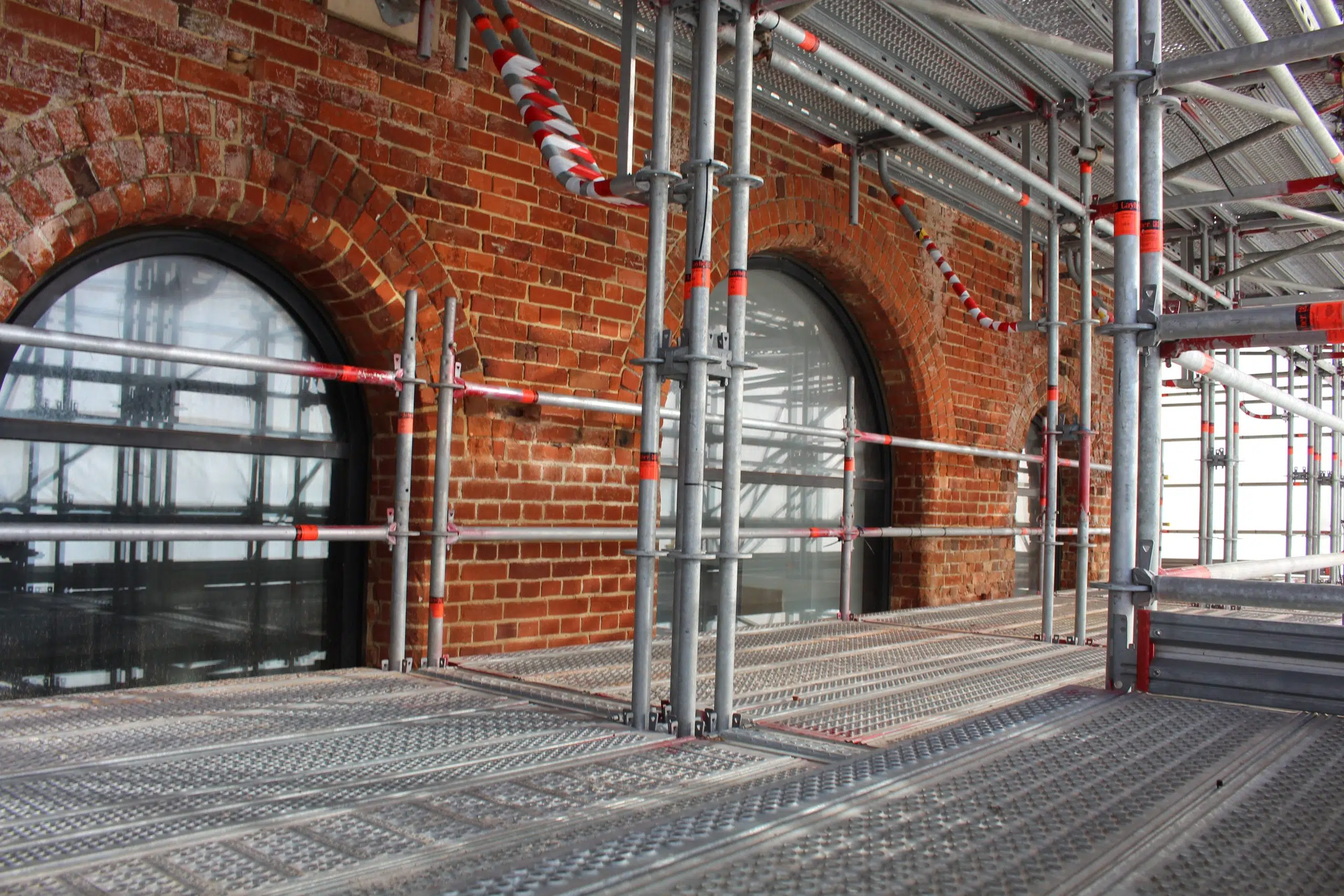 Material handling was supported by the firm’s robotic system, reducing manual handling during labour-intensive phases. Combined with the efficiency of Layher’s system components and reliable material supply, this helped maintain productivity without compromising safety.
Skill Scaffolding says the installation began with scaffold towers and kentledge to support the overall height,before large bridging beams were installed, among the biggest the company has undertaken to date.
Three of Skill’s most experienced gangs were deployed for this phase, working in close coordination as the scaffold took shape.
Material handling was supported by the firm’s robotic system, reducing manual handling during labour-intensive phases. Combined with the efficiency of Layher’s system components and reliable material supply, this helped maintain productivity without compromising safety.
Skill Scaffolding says the installation began with scaffold towers and kentledge to support the overall height,before large bridging beams were installed, among the biggest the company has undertaken to date.
Three of Skill’s most experienced gangs were deployed for this phase, working in close coordination as the scaffold took shape.
Respecting the building at every stage
Throughout the project, protecting the Abbey’s historic fabric remained a priority. Layher Allround enabled safe access from floor level to roofline while minimising contact with sensitive surfaces. Scaffold positioning and protection measures were continually reviewed as works progressed. Skill Scaffolding’s Health and Safety team conducted regular inspections, ensuring the structure remained compliant and secure throughout the restoration.A shared approach to delivery
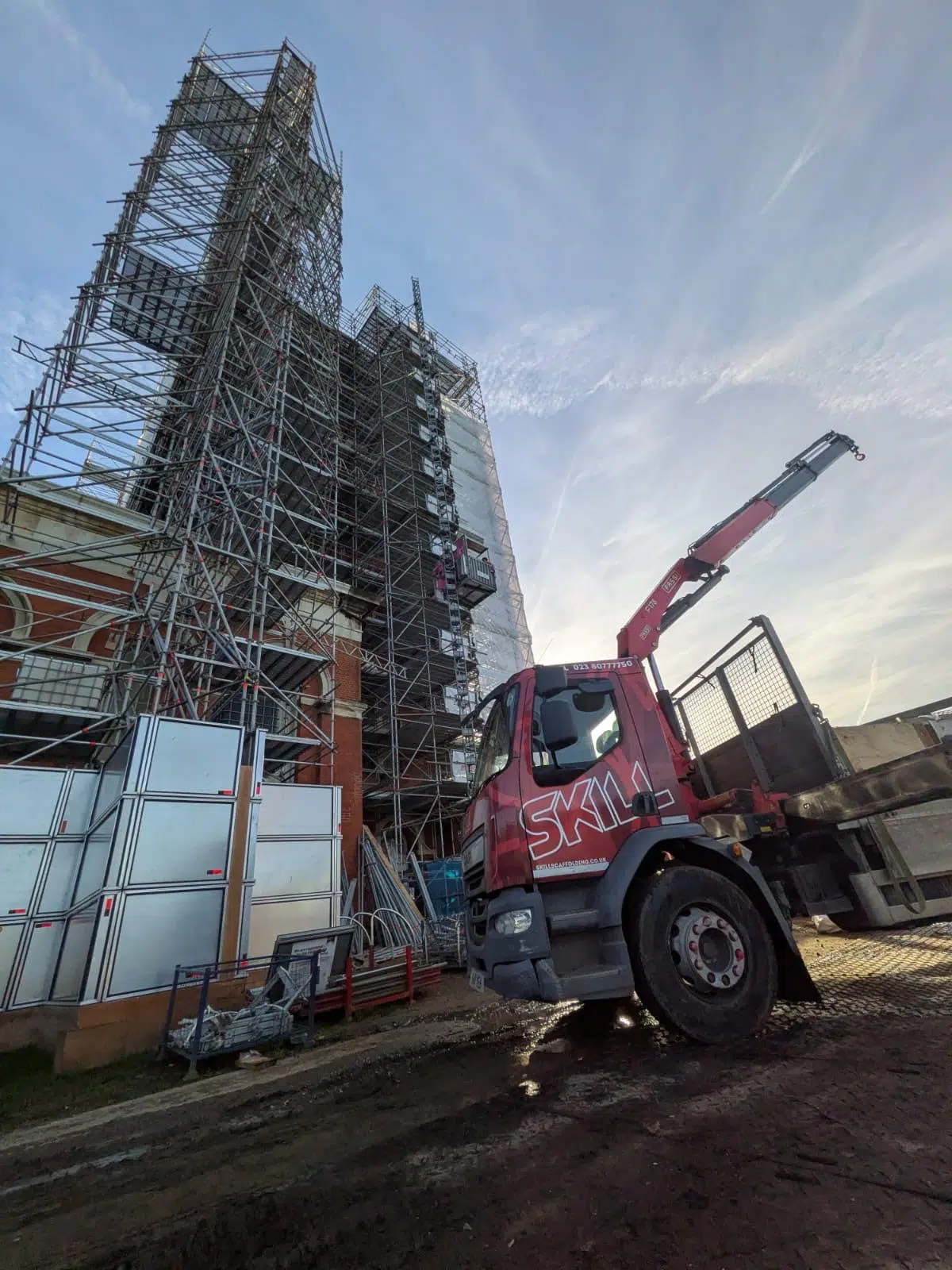 The completed scaffold reflects a shared approach between Layher UK and Skill Scaffolding, combining engineered systems, technical support, reliable supply, and skilled installation. It demonstrates how Layher’s 4×S philosophy translates into practical outcomes on site, particularly on complex heritage projects where there is little margin for error.
The project adds another high-profile heritage scheme to Layher UK’s portfolio and reinforces the role of Layher Allround as a dependable system for demanding restoration environments.
The completed scaffold reflects a shared approach between Layher UK and Skill Scaffolding, combining engineered systems, technical support, reliable supply, and skilled installation. It demonstrates how Layher’s 4×S philosophy translates into practical outcomes on site, particularly on complex heritage projects where there is little margin for error.
The project adds another high-profile heritage scheme to Layher UK’s portfolio and reinforces the role of Layher Allround as a dependable system for demanding restoration environments. GEDA transport system supports renovation of Augsburg landmark
Subscription required
Renovation work is continuing at the Perlachturm in Augsburg, a historic city in the German state of Bavaria, close to the Austrian border.
The tower, which stands about 70 metres high in the city’s central town hall square, dates back to the 10th century and has been rebuilt several times over the centuries. It remains a prominent feature of Augsburg’s historic centre.
As part of the current programme of works, the tower’s copper dome, weighing around ten tonnes, has been removed and temporarily placed in front of the town hall. Internally, the reinforced concrete staircase is being dismantled in phases to allow for the installation of a new staircase.
All trades on the project are using a single vertical transport system, the GEDA 1500 Z/ZP, to move people and materials between working levels. The platform has been installed to the full height of the tower and includes 27 individual stops.
The system operates in two modes. When transporting people and materials, it runs at a lifting speed of 12 metres per minute. When used for materials only, it can operate at speeds of up to 24 metres per minute. This allows the site team to adjust transport arrangements depending on the stage of work.
For this project, a platform configuration with a maximum load capacity of 2,000 kg is being used, providing space for heavier and bulkier materials associated with the renovation of a historic structure. The transport platform is mounted on a two-mast system designed to provide stable access at height.
The works at the Perlachturm highlight the logistical challenges involved in refurbishing historic towers in busy city centres, where access, safety and coordination between multiple trades are key factors.
AK Scaffolding steps up training for Scaffold Builders Competition in Las Vegas
Manchester based AK Scaffolding has started intensive training as it prepares to compete in the SAIA’s Scaffold Builders Competition, set to take place on 20 January in Las Vegas.
The team recently spent time at Layher UK’s Eggborough depot, working with the Layher system as part of its build-up to the competition. The visit focused on familiarisation, speed, accuracy and teamwork, all key elements of the timed event.
Led by Owner and CEO Aaron King, AK Scaffolding will represent the UK and Europe at the event, which forms part of the wider Scaffold & Access Industry Association programme in the United States. Welcoming the team to the depot, Layher UK’s Andy Dallas said the company was pleased to support their preparations. “We are glad to welcome AK Scaffolding and to support them for the upcoming US competition,” he said. “Myself and Layher UK will be watching and rooting for them. Good luck, boys.”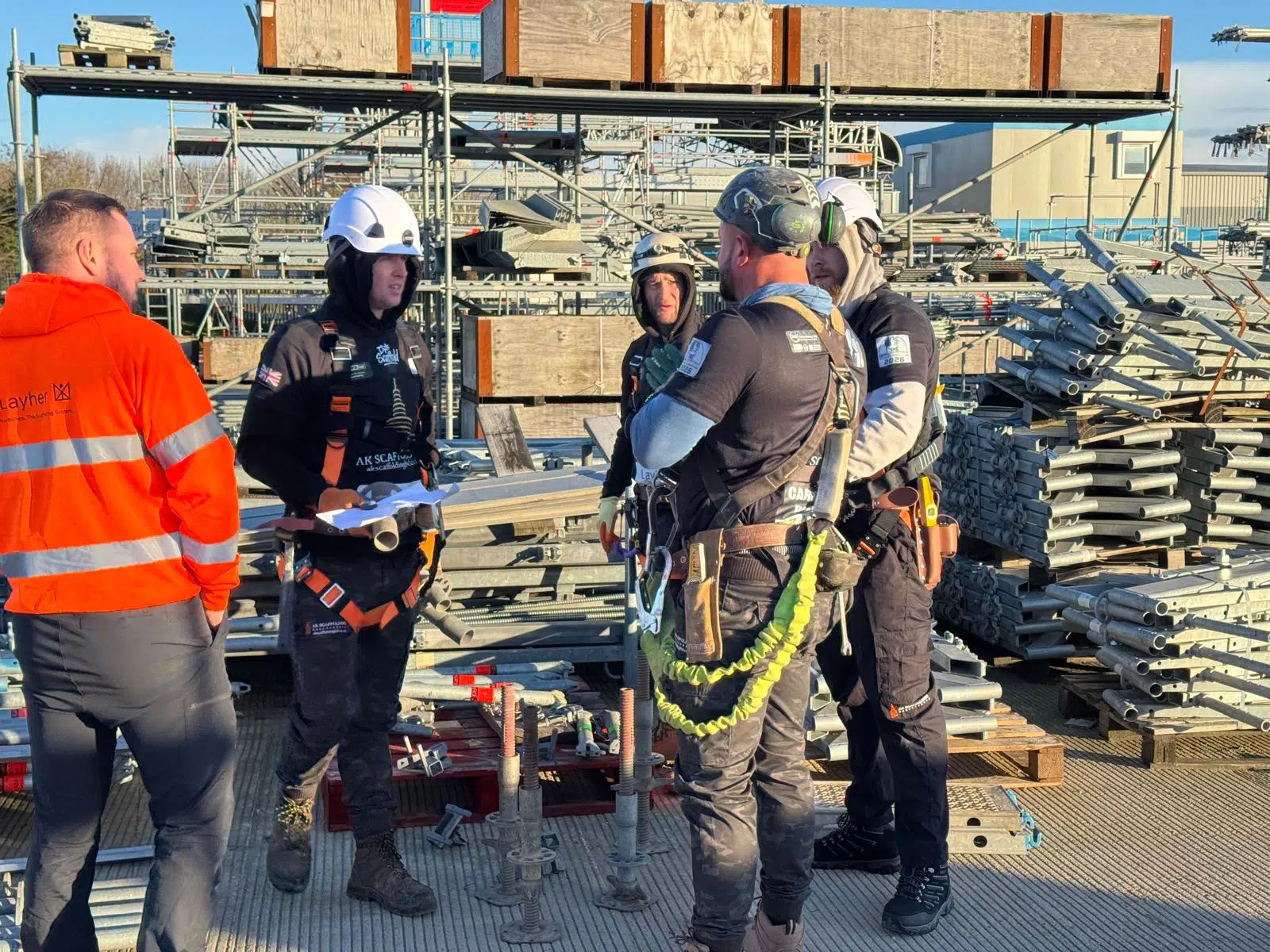 The AK Scaffolding team brings decades of combined experience to the competition. Aaron King has 25 years in the industry and is joined by coach Paul Ward, who has 30 years’ experience. The team also includes Aaron Maguire, Steven Findlay, Stephen Littlehales and Michael Jurkevicius, each with more than a decade working in scaffolding across a range of sectors.
Speaking ahead of the event, Aaron King said the opportunity to compete internationally was a source of pride for the business and the wider UK industry.
“Me and the team are very honoured and privileged to be chosen as representatives of the UK and Europe to compete in the Scaffold Builders Competition,” he said. “We are beyond grateful and will do the UK proud.”
The competition will see teams tested on build quality, safety and speed, with AK Scaffolding aiming to showcase UK skills and standards to an international audience.
The AK Scaffolding team brings decades of combined experience to the competition. Aaron King has 25 years in the industry and is joined by coach Paul Ward, who has 30 years’ experience. The team also includes Aaron Maguire, Steven Findlay, Stephen Littlehales and Michael Jurkevicius, each with more than a decade working in scaffolding across a range of sectors.
Speaking ahead of the event, Aaron King said the opportunity to compete internationally was a source of pride for the business and the wider UK industry.
“Me and the team are very honoured and privileged to be chosen as representatives of the UK and Europe to compete in the Scaffold Builders Competition,” he said. “We are beyond grateful and will do the UK proud.”
The competition will see teams tested on build quality, safety and speed, with AK Scaffolding aiming to showcase UK skills and standards to an international audience. Lindsey Oil Refinery assets sold as refining restart ruled out
Breaking Barriers: Francesca Fuser on Innovation, Leadership, and Pilosio’s UK Ambitions
Building From the Ground Up
Her approach? Unconventional, to say the least. “I started with a notebook and a LinkedIn account. A few trips, a few posts, and from there, I built my community, dedicating all the time I had, weekends and sleepless nights. Because let’s be honest, when results are slow to arrive, sleep doesn’t give you a discount.” That dedication has paid off. Today, she’s spearheading efforts in the UK and the United States, where Pilosio recently signed a partnership with Skyclimber for Flydeck distribution in North America. But it hasn’t all been smooth. “I remember being incredibly tense during the Bridge Conference in Scotland. I had to speak in public, and in English, no less.” A podcast featuring Brené Brown and Adam Grant helped: “Don’t feel any shame being vulnerable, take a deep breath, own it and take on the world.” The biggest lesson? “I’ve often faced limitations due to linguistic, cultural barriers, or simple stereotypes. I realised that it is precisely attentive listening that overcomes every obstacle and builds true value.”Connection as Strategy
Ask Francesca about her leadership style and she doesn’t hesitate. “My leadership style is founded on connection. Empathy is the keystone for me, not only for daily communication but for generating future opportunities.” It’s not just talk. This philosophy runs through everything she does. “Knowing how to attract is the first hook in any lead acquisition funnel.” When it comes to talent, she has a clear philosophy. “I firmly believe that each of us possesses gifts, and the greatest challenge is recognising them and, for the employee, accepting the opportunity to see them emerge.” Take Francesco De Martino, now managing Pilosio’s Dubai branch. “He was a contact from my previous job, and I immediately recognised his talent. When we needed someone for the Middle East market, he was the perfect candidate.” Today, thanks in part to their partner Al Laith, Flydeck is being used on some seriously impressive construction sites.Engineering-Led Innovation
So what makes Pilosio different? For Francesca, it’s the unique combination of manufacturing expertise and real contractor experience. “Pilosio carries a historical legacy of product quality and engineering expertise. Euroedile brings the experience of a leading contracting firm, with decades of direct work on site.” That contractor perspective changes everything. “We don’t innovate for the sake of it, but to solve concrete construction site problems.” The Flydeck system is a perfect example. Born from a real need—rapid, safe installation with minimal logistical footprint—it puts operator safety first. “The health and life of the operators, because less weight means better work.” The numbers tell their own story: 200 square metres per day with just three operators. Applications range from ceilings to stadiums, oil and gas plants to data centres.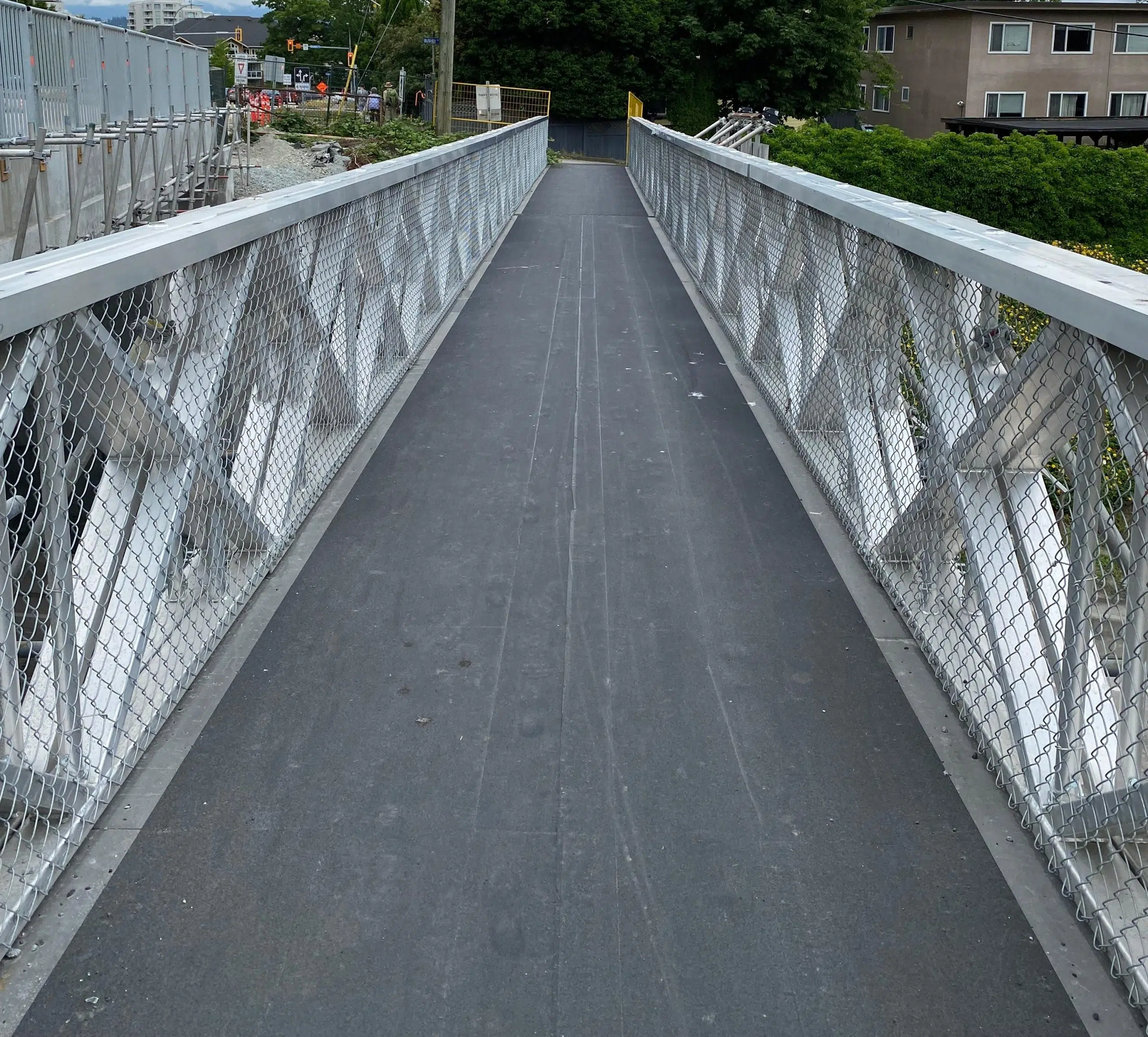
Cracking the UK Market
The UK. For international manufacturers, it’s both opportunity and challenge. “The United Kingdom represents the authority of the scaffolder for everyone. History teaches us this, and it must be respected.” The response has been encouraging. “The UK market appreciates our combination of a certified product and an engineering approach. We’ve seen strong interest in our systems, which offer clear logistical efficiency and assembly time savings.” Pilosio’s calling card? Flydeck. “This system, which the railway and infrastructure industry loves for its installation speed and logistical efficiency, has allowed us to quickly capitalise on brand awareness.”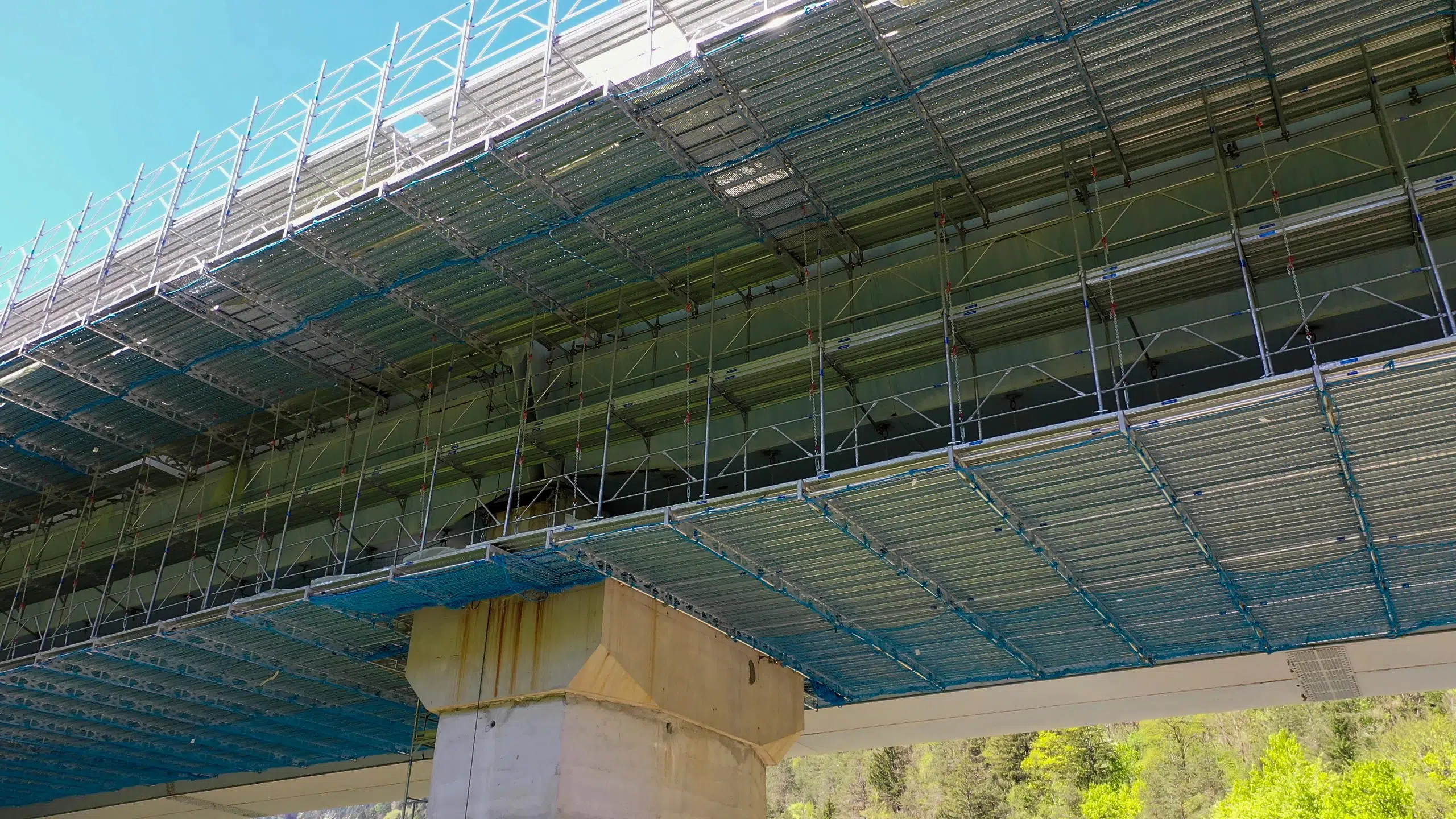 Looking ahead, Francesca sees change coming. “Over the next 12 to 18 months, I expect a significant change of pace in the British market in general. I observe a clear acceleration in terms of open-mindedness and entrepreneurial spirit.”
She’s not naive about the challenges. “We know that tube and fittings are deeply rooted in the UK. It’s a true art, if you will.” But the reality is shifting. “The high pressure on labour costs and project timelines makes it essential to orient every decision towards site efficiency.”
Looking ahead, Francesca sees change coming. “Over the next 12 to 18 months, I expect a significant change of pace in the British market in general. I observe a clear acceleration in terms of open-mindedness and entrepreneurial spirit.”
She’s not naive about the challenges. “We know that tube and fittings are deeply rooted in the UK. It’s a true art, if you will.” But the reality is shifting. “The high pressure on labour costs and project timelines makes it essential to orient every decision towards site efficiency.”
Strategic Partnerships
The partnerships with JMAC and Creator came from a place of self-awareness. “It all starts with self-awareness: when you know who you are, you know how to achieve your goals. Pilosio is not the only player in the scaffolding sector, but in recent years, we’ve distinguished ourselves as the driving manufacturer in innovation.” The alignment with JMAC and Creator felt natural. “Both Luis and Ryan started from scratch and embody our same values of respect, ethics, and a will for change. But what brought us together was a concrete need: the infrastructure sector, particularly the railway world, urgently required an installation partner and a British designer who could support our innovative systems locally.” The partnership structure is carefully designed. “The agreement with JMAC and Creator is structured as an exclusive partnership, but it is vital to define the scope of that exclusivity.” For the Flydeck system’s UK launch, Pilosio needed two distinct partners: JMAC, as the scaffolding specialist to handle exclusive distribution, sales, training, and rental services; and Creator, to provide the initial British design expertise to ensure compliance with UK regulations. But here’s the crucial part. “This partnership does not restrict the end market: the Flydeck system is intended for unrestricted use by all scaffolders in the UK, and any engineering firm can utilise the system in their designs. This collaboration demonstrates that both JMAC and Creator are focused on opening doors for the product, prioritising market growth over restrictive competition.” For Francesca, collaboration isn’t optional. “No player, however innovative, can face today’s complex challenges alone.” She points to the IXI Truss Beam, developed with Arka Chorbajian. “It is by combining Pilosio’s engineering with the practical know-how of those who assemble every day, that is, the mind of an engineer and the hands of a scaffolder, that we create products that are truly efficient and safe.”Sustainability and the Future
At Pilosio, sustainability isn’t just a box to tick. “Our sensitivity toward sustainability is an ethical conviction and a new business model.” The strategy is threefold: keeping production in Italy for quality control, developing products with optimised materials that reduce transport weight and emissions, and creating targeted solutions like the BlueSky system for hydro-washing operations. Is sustainability a dealbreaker? “Absolutely, yes. But I don’t see it only as an individual ethical choice by the customer. It is rather a necessary and unavoidable response to a social and regulatory issue that can no longer be ignored.” Looking ahead, Francesca sees a clear trend. “The future is driven by logistical and site efficiency, but above all, by the valorisation of the operator.” And she’s refreshingly practical about it. “We must stop thinking about science fiction solutions. There’s no need to go to Mars. Instead, we must focus on small engineering attentions that significantly improve life on site.” What does that mean? Minimising time at height. Lighter, modular products. Optimised load capacity-to-weight ratios. Less transport cost. Less physical strain. “Technology doesn’t replace experience. It empowers it, improving efficiency and safety. It requires the courage to embrace new methodologies, but also the willingness to listen to those who propose them.”Personal Reflections
Ask about her proudest moment and Francesca has to think. “From a team professional standpoint, the most gratifying moment was this year at SCAFFEX. Not only for the number of meetings but for the tangible recognition we received in terms of the most innovative stand.” But there’s something else. “Being here today, in an interview of this level, surprised me. It makes me deeply proud of the journey I’ve undertaken and the trust the Pilosio team has placed in me.”
She’s quick to acknowledge the team behind her, particularly Garry Adams, and her primary inspiration, Mr. Parisotto. “The greatest lesson he taught me is the importance of treating the large client and the small client the same way, with the same attention and respect.”
Balancing technical innovation with human leadership comes naturally. “When we develop a system that reduces the time an assembler spends at height, we’re putting human safety first. When we design products that are lighter and easier to assemble, we’re applying the ethic of respect for physical fatigue and daily work.”
But there’s something else. “Being here today, in an interview of this level, surprised me. It makes me deeply proud of the journey I’ve undertaken and the trust the Pilosio team has placed in me.”
She’s quick to acknowledge the team behind her, particularly Garry Adams, and her primary inspiration, Mr. Parisotto. “The greatest lesson he taught me is the importance of treating the large client and the small client the same way, with the same attention and respect.”
Balancing technical innovation with human leadership comes naturally. “When we develop a system that reduces the time an assembler spends at height, we’re putting human safety first. When we design products that are lighter and easier to assemble, we’re applying the ethic of respect for physical fatigue and daily work.”












